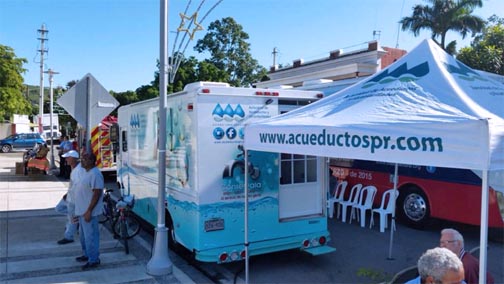S&P cuts PRASA’s revenue bonds ratings to ‘CC’ and ‘D’


PRASA’s roughly $3.4 billion in series 2008 and 2012 senior-lien bonds are secured by a gross-lien pledge of the revenues of its retail waterworks and sanitary sewer system. (Credit: PRASA)
S&P Global Ratings lowered its ratings on the Puerto Rico Aqueduct & Sewer Authority’s series 2008 and 2012 senior-lien revenue bonds two notches to ‘CC’ from ‘CCC-‘. The outlook is negative.
At the same time, the ratings agency lowered to ‘D’ from ‘CCC-‘ the rating on PRASA’s obligations that also carry a Commonwealth of Puerto Rico guarantee, as well as those obligations that are commonwealth-supported. S&P removed the ratings from CreditWatch, where they were placed with negative implications on Aug. 18, 2015.
“The downgrade is based on our view that PRASA’s role and link with the Commonwealth and the Commonwealth’s financial distress have caused a weakening in PRASA’s financial risk profile, as evidenced by its diminished liquidity and large accounts payable that by management’s estimates will take more than one fiscal year to fully address,” said S&P Global Ratings credit analyst Theodore Chapman.
Because of the commonwealth’s ongoing financial distress and uncertainty regarding the resolution of that distress, and the difficulties PRASA faces by its association with the Commonwealth, the water utility has been unable since 2014 to execute a planned revenue bond sale, all while facing a large capital improvement plan driven mainly by unfunded regulatory mandates from the U.S. Environmental Protection Agency and the Puerto Rico Dept. of Health for the sanitary sewer and drinking water systems, respectively.
PRASA management and those environmental regulators recently reached agreements on extensions of some of the deadline-certain mandates, which could provide some measure of relief to the timing and magnitude of future capital investments.
While PRASA has maintained adequate cash from operations and for the most part also at least adequate cash reserves throughout the commonwealth’s downward spiral, the lack of market access caused PRASA two main problems:
- Use of much of its cash reserves to pay off two committed lines of credit. PRASA had historically used these lines as interim financing mechanisms for approved capital projects, with the intent to retire draws on the lines with the issuance of long-term debt. This does not include an operating reserve requirement that had previously been satisfied with a line of credit with the Puerto Rico Government Development Bank (GDB). While PRASA currently has no draws against that line, it expired on June 30, 2016, and GDB will not be renewing or extending it. PRASA will be satisfying the operating reserve requirement with equal monthly payments over five years; and
- A strain on the operating budget; PRASA has had to expense items that under permitted use of tax-exempt debt would normally have been capitalized or reimbursed with bond proceeds. Instead, these outlays have either flowed through the operating budget or payment deferred altogether. It is our understanding that PRASA’s decision not to self-support the commonwealth-guaranteed and supported obligations is because it intends to use those funds to address $150 million of accounts payable to construction firms, vendors, and suppliers that have provided goods and services related to PRASA’s capital program.
PRASA’s roughly $3.4 billion in series 2008 and 2012 senior-lien bonds are secured by a gross-lien pledge of the revenues of its retail waterworks and sanitary sewer system. Under its master agreement of trust supporting those bonds, failure to pay principal of or interest on commonwealth-guaranteed debt or commonwealth-supported obligations is not an event of default, S&P stated.
The $248 million in rated Commonwealth-guaranteed debt and $162 million in rated Commonwealth-supported obligations are intended to be paid from the net revenues of PRASA, subordinate to any obligations under the MAT.
Should those net revenues be insufficient, the obligations carry a General Obligation (GO) pledge and an appropriation pledge, respectively. However, Puerto Rico defaulted on its July 1, 2016, GO and appropriation-backed bond principal and interest payments.
As such S&P Global Ratings lowered its ‘CC’ GO rating to ‘D’, reflecting a default, except on the series 2008 revenue refunding commonwealth-guaranteed bonds. PRASA did make the full and timely interest payment on that series; principal does not begin to amortize until July 2021.
“While PRASA is not obligated to pay on the Commonwealth-guaranteed debt or Commonwealth-supported obligations issued on behalf of the authority, we are also revising PRASA’s stand-alone credit profile (SACP) to ‘sd’ to reflect a selective default. The SACP is S&P Global Ratings’ opinion of PRASA’s general creditworthiness regardless of any role or link to the Commonwealth, and is not a rating but instead a component of one,” S&P said.












